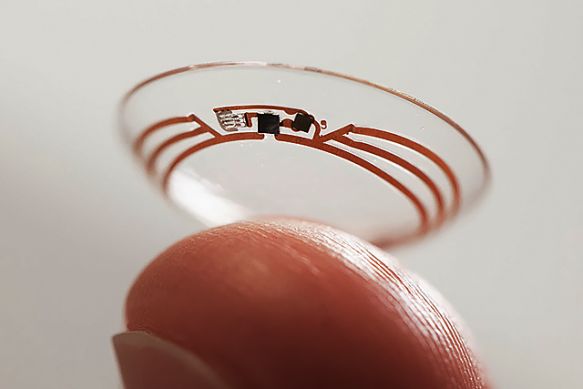Could the Google Lens Make Checking Blood Glucose as Easy as Blinking?
by Patricia Dao
GOOGLE IS BEST known for software products such as Search, Gmail, and Maps. But the company’s top-secret research and development team, Google X, has been laser-focused on incubating unique “moonshot” ideas and products that were previously only imagined in sci-fi movies. Its dedication to developing products that interact with the physical world has spawned an innovation with the potential to revolutionize the way 30 million American diabetes patients manage their disease: a smart contact lens.
In January, Google introduced the incubation of its smart contact lens project, with the goal of designing an easier way for diabetics to manage their glucose levels.
Most of us are unaware of the daily stresses that come with diabetes, from monitoring glucose levels through painful finger pricks to insulin shots to managing exercise and food consumption. It’s an emotionally and physically daunting process. But Google X’s cohort of inventors and the company’s deep financial pockets positioned the team well to tackle this problem head-on.
“We’ve always said that we’d seek out projects that seem a bit speculative or strange, and at a time when the International Diabetes Federation is declaring that the world is ‘losing the battle’ against diabetes, we thought this project was worth a shot,” Google said in its announcement. To make the lenses work, the team layered a small glucose sensor and a wireless chip between two soft contacts. The sensor monitors the patient’s tears; if glucose levels drop or get too high, tiny lights turn on to automatically communicate to the patient that he or she has fallen into the danger zone and needs to take action to stabilize his or her glucose level. If this invention works, it could end the daunting and life-intruding process of checking glucose levels at certain times of the day.
So why aren’t the lenses in health care providers’ offices or on store shelves? Although Google X is research and development royalty, it isn’t a manufacturer. Consider Google X products such as Google Glass and self-driving cars: These buzz-worthy devices make for great watercooler conversation, but because of cost and accessibility, few can actually own them.
That said, these smart contact lenses might be on the fast track to getting into the public’s hands. Swiss pharmaceutical company Novartis recently announced that it will collaborate with Google X to develop the lenses through a licensing deal. “Our dream is to use the latest technology in the miniaturization of electronics to help improve the quality of life for millions of people,” Google cofounder Sergey Brin said in a press release.
The partnering companies aren’t stopping at diabetes management. They will also focus on using the technology of embedded microchips and sensors in contacts for vision correction, to help restore the eye’s natural autofocus.



